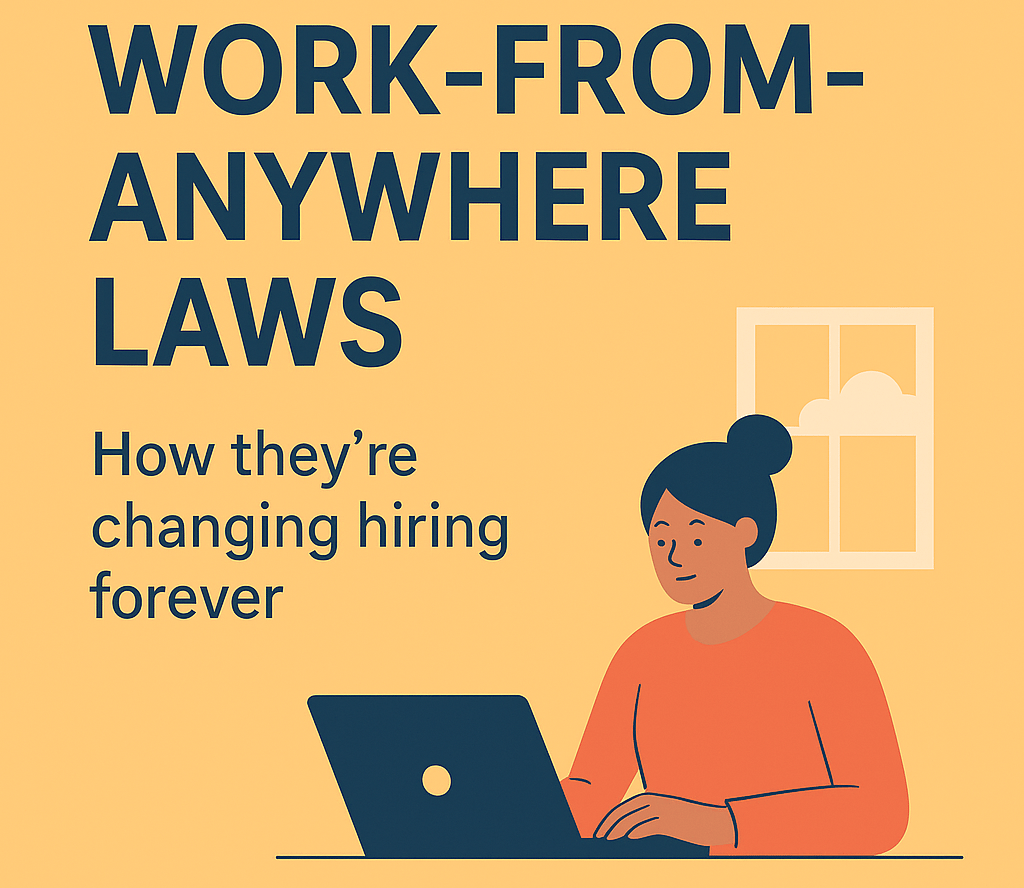Work-from-Anywhere Laws: How they’re changing hiring forever.
This article examines the global rise of "work-from-anywhere" (WFA) laws and policies, and how they are reshaping hiring and work opportunities worldwide. With a special spotlight on the Caribbean alongside North America, Europe, and beyond, we explore the opportunities, challenges, and the future of global hiring.
FUTURE OF WORK & MARKET TRENDS
E-Spire
9/6/20252 min read


A Global Shift Toward Work-from-Anywhere
Remote work is no longer a trend; it’s a global reality. The COVID-19 pandemic accelerated the transition, and now governments are formalizing it with "work-from-anywhere" laws. These initiatives are transforming how companies hire and how employees live.
Globally, countries are racing to attract remote workers. The Caribbean has been a pioneer: Barbados launched its 12-Month Welcome Stamp Visa in 2020, while Antigua & Barbuda, Dominica, and The Bahamas followed with similar programs. In Europe, Estonia, Portugal, and Croatia have led the charge with digital nomad visas. Meanwhile, in North America, U.S. states and Canadian provinces are redefining tax and labor frameworks to accommodate remote workers who move across borders.
Why Work-from-Anywhere Matters Globally
Expanding Global Talent Pools
Employers now have access to the world. A Caribbean software developer can work for a U.S. startup, while a Canadian consultant can serve a client in Spain. This global reach is opening doors for underrepresented regions.Boosting Local Economies
WFA policies bring economic benefits to host countries. The Caribbean, for example, has seen remote workers contribute to rental markets, restaurants, and small businesses. Portugal and Croatia report similar local economic boosts.Cost Efficiencies for Companies
Remote-first models reduce office overheads and relocation costs. At the same time, employers balance salaries against cost-of-living differences globally.Flexibility for Workers
For workers, WFA laws mean the freedom to design their lifestyles. A European professional may relocate to the Caribbean for better work-life balance, while a Caribbean national may stay home and still work for a global firm.New Legal Complexities
Taxation, compliance, and worker rights vary across borders. The Digital Nomad Handbook (Lonely Planet) highlights how navigating these regulations requires diligence and careful planning.
Regional Perspectives
Caribbean: WFA laws are redefining the region’s economic model, reducing dependency on seasonal tourism while attracting year-round, high-earning remote professionals.
North America: Employers grapple with tax complexities as staff relocate across state and provincial lines. This has prompted new compliance frameworks.
Europe: According to Eurostat, nearly 25% of EU workers worked remotely for at least part of 2022. Digital nomad visas in Portugal, Spain, and Croatia formalize cross-border employment.
Global South: Countries in Africa and Asia are exploring similar visas, seeking to tap into the remote-work wave to diversify their economies.
Challenges of Work-from-Anywhere
Cross-border compliance: Misclassification and tax obligations can complicate arrangements.
Cultural integration: Global teams face time-zone challenges and risk weaker company cultures if not managed well.
Equity concerns: Adjusting salaries based on location could widen inequalities.
The Future of Global Hiring
By 2030, McKinsey Global Institute predicts up to 30% of the global workforce could work remotely most of the time. WFA laws position the Caribbean and other regions as players in a truly global talent marketplace. Companies that adapt early will have the advantage, but success depends on balancing flexibility, compliance, and fairness.
Conclusion
Work-from-anywhere laws are reshaping the global hiring landscape. For the Caribbean, this represents both a challenge and an opportunity: a chance to attract global talent, retain local professionals, and diversify economies. As Richard Baldwin notes in The Globotics Upheaval, the fusion of technology and globalization will continue to reshape work,making adaptability key for both employers and workers.
References
Baldwin, R. (2019). The Globotics Upheaval: Globalization, Robotics, and the Future of Work.
Lonely Planet. (2020). The Digital Nomad Handbook.
McKinsey Global Institute (2022). Future of Work Report.
Eurostat Employment Data.
About E-Job Services
At E-Job Services, we help job seekers and companies navigate today’s evolving employment trends. From sharing opportunities to providing training and career support, we are your partner in building sustainable futures.
🌐 Visit us at e-jobservices.online to learn more.
